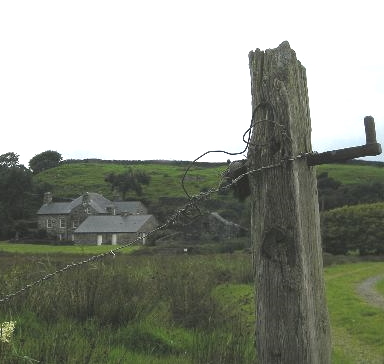Ellis Wynne of Lasynys
Born 7 March 1671 - died 13 July 1734
Occupation priest, poet
The Lasynys, the home of Ellis Wynne. The building dates from around 1600 but was extensively renovated by the writer in the period 1715-20.
Ellis Wynne was a religious writer and translator. He is well known as the author of the Visions of the Sleeping Bard, which is considered one of the classics of Welsh prose.
Ellis Wynne was born in Lasynys (or Lasynys Fawr), a substantial farmhouse between Talsarnau and Harlech, in the old County of Merioneth (South Gwynedd), the son of Edward Wynne of Glyn Cywarch mansion (not far from Lasynys). It was a family of noble origin with a connection to the Brogyntyn family, near Oswestry. Through his grandfather Elis Wyn, Ellis Wynne was related to John Jones, Maesygarnedd, one of those who signed the warrant for the execution of King Charles 1st of England.
Unlike John Jones of Maesygarnedd, Ellis Wynne was a staunch royalist. The details of his career are uncertain, but he appears to have spent a period at Shrewsbury Grammar School. A Latin poem by Wynne suggests a connection with Beaumaris Grammar School as well. He went to Oxford where he graduated on the 1st of March 1692, aged 21. It is possible that he met the multi-talented genius Edward Llwyd while he was there. In September 1698 he married his first wife, Lowri Wynne from Moel-y-glo, Merioneth.
He was ordained a priest and deacon in Bangor cathedral in December 1704. He became rector of the parishes of Llanbedr and Llandanwg in 1705 and then had the pastorate of Llanfair, near Harlech, in 1710. In 1711 he married his second wife, Lowri Lloyd of Hafod Lwyfog (near Aberglaslyn) and moved to Lasynys again where he lived for the rest of his life. He died on 13 July 1734 and was buried in Llanfair church.
Ellis Wynne translated the Rule of Holy Life (from Jeremy Taylor's English work) in 1701 and an edition of the Book of Common Prayer in 1710.
However, his main literary work is the prose text Gweledigaethau y Bardd Cwsc (Visions of the Sleeping Bard) (1703), which is loosely based on Roger L'Estrange and John Stevens' English translations of the book Los Sueños ( 'The Dreams') by the Spaniard Don Francisco de Quevedo (1580-1645). The poet sees three visions as he navigates through the world (Vision of the course of the World), through death (Vision of Angeu in his lower Royal Court) and through hell (Vision of Hell). He is accompanied by
an angel on earth and in hell and by a Master of Sleep in the Kingdom of Death. The work depicts a sinner's journey from this world through death to hell. The Visions is a burlesque book written in natural and refined Welsh that expresses the viewpoint of a royalist and churchman on the state of the country in his time. It shows the author's mastery of classical Welsh as well as the spoken Welsh of the period at its sexiest. A vision of the Court of Death is found there, and it is possible that Wynne
intended a second volume on the Court of Paradise as a successor to it. As well as imaginative descriptions of Hell and scathing satire, there are, as a striking contrast, pieces of very charming prose, especially the famous opening which describes the country around Harlech through the author's binoculars.
Ellis was also a collector and copyist of Welsh manuscripts. One of the manuscripts he received was one containing a number of prophetic poems, including some based on "Y Bardd Cwsg" (Rhys Fardd).
He didn't write much poetry but one of his poems, 'Gadael Tir', which is found at the end of the second part of the Sleeping Bard's Visions, is a small classic that has won its place in several Welsh anthologies. The poets Siôn Rhydderch and Robert Humphrey wrote hymns for him. He also composed several hymns. The most famous is the one that begins with the line 'I am the Great Resurrection.'



